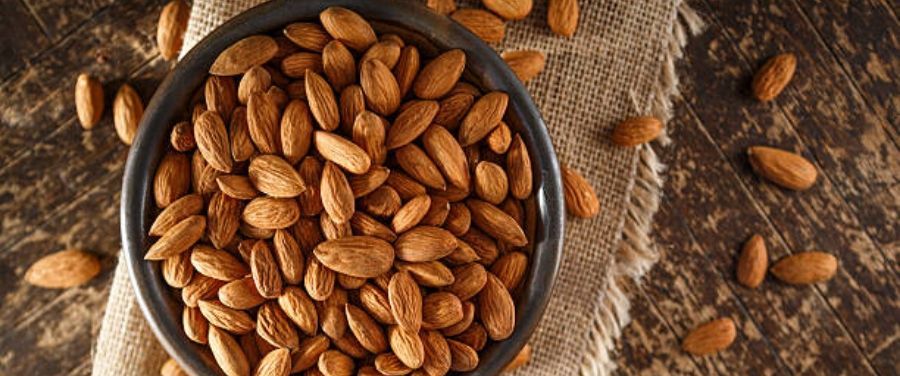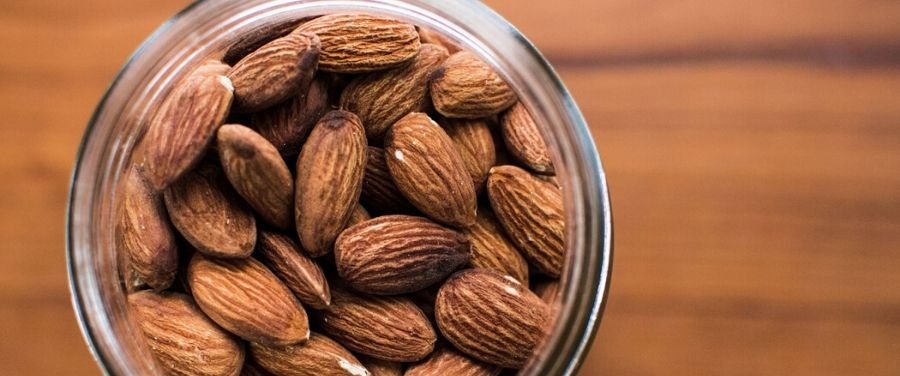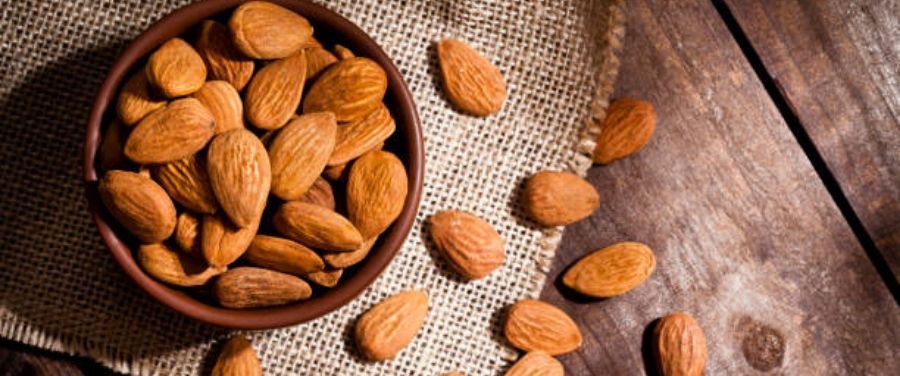OVERVIEW:
You must have heard about the benefits of eating almonds to the body. But have you ever eaten soaked almonds? By eating 4 to 5 soaked almonds in the morning everyday, keep you away from diseases and your body also gets strength. You will get essential things such as fiber, protein, E vitamin, anti-oxidants, along with other nutrients whenever you eat almonds. Their calorie content is high, but doesn’t cause fat gain.
There are lots of studies that are performed trying to determine how almonds are, and people are surprised with the results. A few of these health benefits include that almonds are high on vitamins and nutrients, although low on calories.
WHAT ARE ALMONDS?
Almonds are a type of nut that grows on trees. They are often eaten as a snack, but can also be used in recipes. Almonds are a good source of fiber and protein, and can help you lose weight or maintain a healthy weight.
There are three main types of almonds: sweet, bitter, and marcona. The most common type is sweet almond. Bitter almonds are not commonly eaten in Western countries but are popular in Mediterranean countries. Marcona almonds are smaller than other varieties of almonds and have a sweeter taste.
Sweet almond flour can be substituted for wheat flour in baking for people with gluten allergies. Raw almonds have been shown to provide significant health benefits such as improved brain function, more energy, better digestion, lower cholesterol levels, and relief from various chronic diseases like cancer.
Unsalted roasted almonds are the best option for those who want to eat them as a snack. Dry roasted and honey roasted almonds should only be eaten occasionally because they contain added sugar.
Blanched almonds need to be soaked overnight before eating because they contain phytic acid which has been linked to digestive issues and mineral deficiencies when consumed in large quantities.
Chopped raw almonds make a great topping for salads and oatmeal. Eat unroasted nuts in moderation because they may increase your risk of heart disease, obesity, and diabetes if eaten in excess. Almond milk is an excellent alternative to dairy milk if you are lactose intolerant or vegan.
ARE ALMONDS REALLY GOOD FOR YOU?
Almonds are not only a delicious snack, but they’re also packed with nutrients that can benefit your health. Almonds are a good source of fiber, protein, and healthy fats, as well as vitamins and minerals like magnesium and vitamin E.
Including almonds in your diet can help lower cholesterol levels, improve blood sugar control, and promote weight loss. A recent study even found that almond-eating participants lost more weight than those who did not eat almonds at all. So why wait? Get crunching on these superfoods today!
ALMOND NUTRITION PROFILE:
About 100 grams of raw almonds contain (✔️) —

- 575 calories
- 21.7 g carbohydrate
- 49.4 g fat
- 21.2 g protein
- 264 mg calcium
- 3.7 mg iron
- 268 mg magnesium
- 484 mg phosphorus
- 705 mg potassium
It is also rich in vitamin E, folate, choline, niacin, selenium, manganese, zinc, sodium and omega-3 fatty acids.
WHAT ARE THE HEALTH BENEFITS OF EATING ALMONDS?
Have you any idea how almonds are valuable for your health? Almonds are my nut mornings I usually add seven to ten almonds in my own breakfast. Since people will agree almonds are tasty and nutritious, health benefits of eating almonds are:
1. Almonds for Cholesterol:
Almonds are nuts known to stop the oxidation of low-density lipoprotein (LDL) cholesterol, preventing clogging of blood vessels and improves heart health. They also protect LDL from oxidation, which is a crucial step in the development of heart disease. The skin of almonds is rich in polyphenol antioxidants, that prevent the oxidation of cholesterol in test-tubes. The effect may be even stronger, when combined with vitamin E.
If you’re not an almond fan, you may still be able to reap these benefits by including other nuts in your diet. Walnuts, cashews, pistachios and peanuts all contain heart-healthy monounsaturated fats that can help reduce cholesterol levels.
Additionally, peanuts have a similar low glycemic index as almonds do. Other foods with a low glycemic index include beans and whole grains. Beans, such as black beans and lentils, can also provide heart-healthy benefits while helping to regulate blood sugar levels.
Whole grains such as barley and brown rice have a lower glycemic index than refined carbohydrates like white bread or sugary snacks. Even high-fiber fruits like blueberries have a low glycemic index because they’re digested slowly. Eating a variety of nutritious foods will give you the best chance at maintaining healthy cholesterol levels while controlling your blood sugar level too!
2. Almond Helps Reduce Stress:
Almonds are one of the most popular nuts in the world, and for good reason! Not only are they delicious, but they’re also packed with nutrients that can benefit your health in many ways. Perhaps one of the most well-known benefits of almonds is their ability to help reduce stress levels.
Studies have shown that consuming almonds can help lower cortisol levels, which is the hormone responsible for stress. So next time you need a break from all things chaotic, grab some almonds and you’ll be feeling less stressed in no time. If you’re looking for other simple ways to manage stress, try taking a relaxing bath or going on a walk outside.

3. Almond for Diabetes:
Benefits of almonds can also be seen to support healthy blood sugar levels. The protein in almonds has a low glycemic index, meaning it doesn’t cause rapid spikes in blood sugar. That’s a good thing for people with diabetes or pre-diabetes, since it reduces insulin levels and helps stabilize blood sugar levels already within a normal range.
Snacking on almonds between meals may even reduce your overall carbohydrate intake throughout the day, resulting in better blood sugar control and possibly weight loss as well.
According to a study, consuming handful of almonds works as a panacea for diabetes patients. The fat, protein, fiber and magnesium found in it, benefits diabetes patients. By consuming almonds daily, you can control the amount of insulin and blood sugar in the body.
Adding almond milk or cream to your coffee might help you cut back on calories and keep hunger at bay. Studies show that almond milk is an excellent alternative for diabetics because it is lower in sugar than regular cow’s milk or soy milk, so it has a minimal impact on insulin levels.
4. Almonds for Brain Health:
Almonds are one of the world’s most nutritious and versatile nuts. Not only are they a good source of energy, but they also contain important vitamins, minerals, and antioxidants that can help keep your brain healthy.
Studies have shown that people who eat almonds are less likely to suffer from Alzheimer’s disease or other cognitive decline as they age. The Omega-3 fatty acids in almonds may help reduce inflammation in the brain, which is linked to many types of mental disorders.
Almonds contain riboflavin as well as L-carnitine, nutrients that increase brain activity, which can also reduce the potential risk of Alzheimer’s disease. Research has been done seeing, if almonds might help with things such as, colorectal cancer and Alzheimer’s disease. There were some positive results in these studies.
The antioxidants found in almonds may also be able to protect cells against oxidative stress and DNA damage. Almonds are considered one of the best sources for these antioxidant compounds such as Vitamin E, Selenium, Lutein and Zeaxanthin.
They are also rich in protein, fiber, vitamin B1 (thiamine), manganese, potassium and magnesium. One ounce of almonds provides almost 12% of the daily value for copper, 14% of calcium, 15% iron and more than 20% vitamin E.
With so many benefits, it’s no wonder almonds are considered one of the best sources of plant-based nutrition around. In fact, more than two-thirds of people in America include them as part of their regular diet.
Almonds are often used in breads, muffins, desserts and baked goods because of their mild flavor and texture. Toss some raw almonds into a salad for added crunch, sprinkle them on yogurt for breakfast or enjoy them with an apple for a healthy snack.
5. Almonds for Heart Health:
Almonds are often lauded for their health benefits, and for good reason. These little nuts are packed with nutrients that can support heart health. For example, almonds contain monounsaturated fats, which can help reduce bad cholesterol levels in the blood. Additionally, the magnesium in almonds can help keep blood pressure in check. So if you’re looking to support your heart health, snack on a handful of almonds every day.

Eating almonds increases alpha-1 HDL level in the body. Alpha-1 HDL helps in reducing rising levels of cholesterol. So it is important that you consume almonds daily. An analysis demonstrated people, who consumed nuts 5 times each week, had a 50% loss in risk of myocardial infarction in accord.
6. Almond Strengthens Your Bones:
Benefits of almonds can also be seen here. Almonds are a good source of calcium, which is necessary for bone health. They’re also a good source of vitamin E, which helps protect bones from damage.
In addition, almonds contain magnesium and phosphorus, both of which are important for bone health. So if you’re looking for a nutritious snack that will also help keep your bones healthy, reach for a handful of almonds!
7. Almonds for Kidney Patients:
Almonds are a nutritional powerhouse and have been linked with a variety of health benefits, including improved kidney function. If you’re looking to improve your kidney health, consider adding almonds to your diet.
They may reduce chronic kidney disease symptoms. One study found that people who consumed more than 50 grams of almonds per day for two months had reduced levels of CKD-related protein markers in their urine when compared to those who ate only 7 grams per day.
The nuts may also decrease cholesterol levels in the blood by an average of 18% over six weeks, which can significantly reduce the risk for cardiovascular disease.
8. Almonds for Constipation:
Almonds are a good source of fiber, which is essential for promoting regularity and preventing constipation. Fiber works by absorbing water and softening stools, making them easier to pass.
Almonds also contain prebiotic fiber, which helps feed the good bacteria in your gut and keep your digestive system healthy. So if you’re looking for a natural way to keep things moving, reach for a handful of almonds!
NOTE: Drink one glass of water after eating 4-5 almonds daily. This will eliminate your constipation problem. Its intake also reduces the risk of stomach cancer.
9. Almonds for Weight Loss:
Almonds are a healthy, nutritious snack that can help you lose weight. They’re high in protein and fiber, which keep you feeling full longer and help you eat less overall. Plus, they contain healthy fats that can help boost your metabolism.

If you are suffering from obesity, then your appetite is controlled by consuming 4 to 5 almonds daily. Consuming almonds gives you fiber, protein and fat, which reduces obesity. One study shown none of the study groups experienced fat gain, who added almonds into their diet according to the study of Dr. Gene Spiller, Director of Health Research and Studies Center.
Pop two to three raw almonds in your mouth after meals to curb hunger pangs. The fats from these nuts will slow down digestion, so you’ll feel fuller longer and less likely to overeat during mealtime.
So if you’re looking to slim down, reach for a handful of almonds instead of unhealthy junk food. Your waistline will thank you!
10. Almonds for Blood Pressure:
High blood pressure is a common condition that can lead to serious health problems. Luckily, almonds may be able to help. Several studies have shown that eating almonds can lower blood pressure. This may be due to the high levels of magnesium, potassium, and calcium in almonds. Plus, the healthy fats in almonds can help reduce LDL (bad) cholesterol levels.
Almonds are rich in magnesium, which helps to lower blood pressure levels. higher level of blood pressure leads to strokes, heart attacks and kidney failure.

Magnesium deficiency is strongly linked to hypertension or high blood pressure. Studies reveal that correcting a deficiency in magnesium may lead to major reactions in blood pressure. So if you have high blood pressure, snack on a handful of almonds a day or add them to your favorite recipes.
11. Almonds for Hair Health:
Almonds are not only a delicious snack, but they can also be used to improve the health and appearance of your hair. When used as a hair mask, almonds can help moisturize your scalp, strengthen your hair, and promote hair growth.
To make an almond hair mask, simply combine 1/2 cup of almond flour with 2 tablespoons of olive oil and 1 egg. Apply the mixture to your hair and let it sit for 30 minutes before rinsing it out. The natural oils in the almonds will moisturize your scalp while repairing damage caused by styling products.
The protein in the eggs will strengthen your hair, giving you fuller locks with less breakage. The eggs also provide a perfect protein-packed alternative to many store-bought hair masks that contain chemicals or animal byproducts. If you have an allergy or just want to try something new, replace the eggs with banana and see if that works better for you!
12. Almonds for Skin:
Almonds are not only delicious, but they’re also great for your skin! Loaded with vitamins E and A, as well as omega-3 fatty acids, almonds can help keep your skin looking its best. Here are a few ways to incorporate them into your beauty routine:
- Smooth almond butter onto your face and let it sit for five minutes before rinsing it off.
- Mix crushed almonds with one teaspoon of honey to make an exfoliating scrub.
- Soak whole raw almonds in hot water overnight, then peel off the skin and rub the inside on your face like a mask.
- Use almond oil in place of lotion or moisturizer for dry areas such as elbows or knees. The almond oil will penetrate deep into the skin and leave you feeling hydrated without any greasy residue.
- Make a DIY face scrub by mixing 1⁄2 cup of sugar with 1⁄4 cup of almond meal until a paste forms. Rub this mixture all over your face and rinse thoroughly with warm water. Your skin will be left clean, fresh, and soft!
- Save money on expensive specialty scrubs by using mashed bananas instead. Bananas are rich in alpha hydroxy acid which is a natural chemical that helps remove dead cells from the surface of your skin. Mashed banana combined with salt makes an excellent facial scrub that removes dirt, excess oils, and even blackheads. Just mix together equal parts banana and salt, apply to your face, and rinse away with warm water. Done!
- Slather almond oil on hands nightly before bed to soften cuticles and fight against wrinkles.
- Replace heavy creams or ointments with organic almond oil for soothing relief of itchy skin conditions such as eczema or psoriasis. It’s safe for sensitive skin types too because there’s no risk of reaction due to fragrance allergies.
Additional Benefits:
A tablespoon of almond oil with few drops of ginger or onion juice help in alleviating whooping cough, asthma and bronchitis. Raw almond butter contains monounsaturated fats that are better than unhealthy fats. It may be ready freshly at home and is better than purchased butter.
Vitamin E present in almonds nourishes your skin. It removes many problems of your skin and keeps it healthy. Face pack made out of vanilla, rosebud milk and paste lotion is quite fantastic for black heads, pimples, dry skin and wrinkles. Regular consumption of almonds is good for enhanced sexual power. A nutrient for the nerve system according to Ayurveda, they help into increase high intellectual level as well as longevity.

HOW TO STORE ALMONDS?
Almonds are a versatile nut that can be used in sweet or savory dishes. To keep them fresh, store them in an airtight container in a cool, dry place. You can also keep them in the fridge or freezer for longer storage. When you’re ready to use them, just give them a quick rinse under cold water.
Use raw almonds for recipes where they will be pureed and cooked such as pesto sauce or almond milk. Roasted almonds have a rich and smoky flavor that pairs well with spicy foods like Mexican mole sauce and Indian curry dishes.
5 DELICIOUS WAYS TO EAT MORE ALMONDS:
Almonds can be eaten in many different ways:
- Almond butter is delicious, nutty alternative to peanut butter that is perfect for spreading on toast or using in recipes.
- Almond milk is a dairy-free option that is rich and creamy while being low in calories. It’s perfect for those who are lactose intolerant or looking for a healthier alternative to cow’s milk.
- Almond flour can be used in place of regular flour to make gluten-free and low-carbohydrate baked goods.
- Almonds are great for baking because they provide moistness and texture to baked goods like cakes, muffins, cookies, breads, and more.
- Enjoying almonds every day as part of a balanced diet will help you stay healthy! Almonds provide a good source of vitamins E, K, and B6 which help lower your risk of heart disease. They also contain protein, fiber, magnesium and vitamin D which promote weight loss when eaten in moderation.
It’s best to enjoy almonds in their natural form because adding artificial ingredients takes away from the nutritional value.
FINAL WORDS
Almonds are an excellent source of protein, fiber, healthy fats, vitamins, and minerals. They’re also incredibly versatile, and can be used in sweet or savory dishes, or simply enjoyed on their own as a nutritious snack. So what are you waiting for? Go out and stock up on these nutritional powerhouses today!
Take note that nuts are high in calories compared to other foods, so eat them sparingly if you want to lose weight. Some studies have found that people who ate about seven ounces of nuts each day — about two handfuls — were more likely to gain weight than those who didn’t consume nuts at all (though other studies have debunked those findings). It may be that nut eaters tend to overdo it when it comes to calories overall instead of packing away tons of nuts by themselves.
RELATED ARTICLES:
